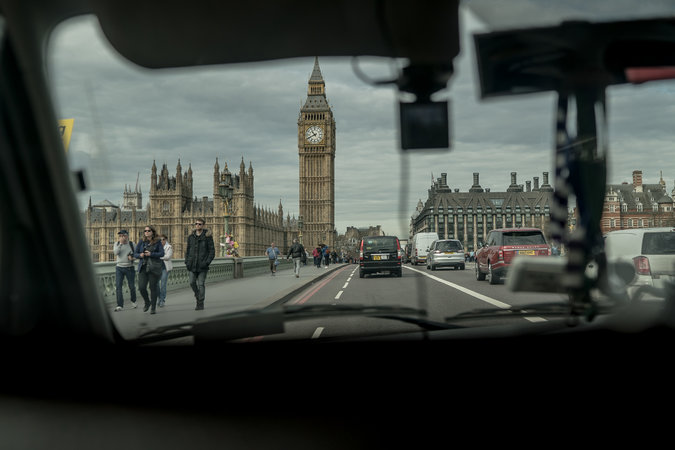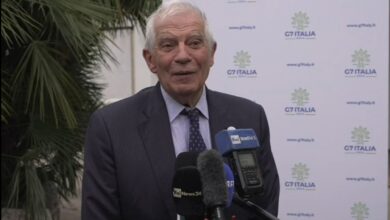Black Cabs and Uber Fight for a Future

London’s cabby wars are less about the disruptive power of an
app, or a new business model, than about the disruption of Britain.
Shortly before 6 a.m., Zahra Bakkali tiptoed out of her bedroom for morning prayers. She prepared breakfast (black tea and toast with olive oil), saw her children off to school, then rode the elevator to the garage below her southeast London housing project. She unlocked her white Toyota Prius, switched on the Uber app and awaited the day’s first job.
In a modest bungalow on the opposite side of the city, Paul Walsh had coffee and toast with butter. He studied the sports pages (his soccer team, Queens Park Rangers, had been struggling) and waved goodbye to his wife and son. Then he fired up his black cab, which is actually half-pink with an Elvis ad from the Memphis tourism board, and set off for Heathrow Airport.
They travel the same streets every day, strangers but also adversaries in what has become a familiar 21st-century conflict: the sharp-elbowed ride-hailing company Uber, versus entrenched taxi companies.
And yet the clash in London is different, less about the disruptive power of an app, or a new business model, than about the disruption of Britain. London’s cabby wars echo the culture wars that fueled Britain’s vote last summer to leave the European Union — and that have brutally flared up again in recent weeks: immigrant versus native, old versus new, global versus national.
Uber arrived in 2012, just before the London Olympics, but its 40,000 drivers already far outnumber the city’s 21,000 traditional cabbies. They use satellite navigation to find their way around. Most of them are nonwhite, and many, like Mrs. Bakkali, are immigrants.
Uber fares are about 30 percent lower than those of black cabs — a discrepancy that cabbies say signals a deliberate attempt to kill off their trade. “London without black cabs,” Mr. Walsh said, “would be like London without Big Ben.”

Zahra Bakkali preparing her car for a shift as an Uber driver. She immigrated from Morocco in 1997 and started driving for Uber last year. CreditAndrew Testa for The New York Times
The vote to leave the European Union, known here as Brexit, exposed a deep rift between those who have profited from globalization, sometimes spectacularly, and those who feel threatened by immigration and automation. Six out of 10 Londoners, including Mrs. Bakkali, voted against Brexit. But Mr. Walsh and most black-cab drivers interviewed for this article voted in favor.
One year after that vote, Britain is on edge. More divided than ever after an inconclusive election, the country has lived through four terrorist attacks in recent months — three by British Muslims and one against them. A charred housing project where a fire killed at least 80 mostly disadvantaged tenants in one of London’s richest boroughs has turned into a somber monument to inequality.
Uber, meanwhile, has become its own symbol of excess. Revelations of an aggressive corporate culture that saw employees harassed, drivers mistreated and regulators dodged forced the company’s founder, Travis Kalanick, to resign as chief executive last month.

Paul Walsh driving his black cab. Uber, he said, is not just killing a business model: “It’s killing a culture.”CreditAndrew Testa for The New York Times
Mrs. Bakkali, the daughter of Moroccan farmers, and Mr. Walsh, the son of a north London construction worker, are small players in these much bigger dramas. They want the same thing: to claw their way into the middle class and give their children a shot at a better life. Yet they are on opposite sides of a kind of low-level guerrilla warfare on London’s streets.
“They drive up to you so close, you find yourself going through a red light,” Mrs. Bakkali said of black cabs she had encountered. The drivers give the middle finger, she said, and shout abuse. And they certainly “never give way.” Some black cabs have offensive cartoons on display. One even had a custom license plate: “H8 UBER.”
For Mrs. Bakkali, black cabs have become a byword for populism and racism. For Mr. Walsh, Uber is shorthand for everything he believes is wrong with globalization — and proof that successive governments have failed hard-working citizens like him.
Grant Davis, chairman of the London Cab Drivers Club, recounted a meeting with a minister in the Conservative government about a year ago. “I said to him, ‘I’m from a working-class family, I grew up in social housing,’” said Mr. Davis, who has driven a black cab in London for 29 years. “I said, ‘I believed in the conservative ethos: Work hard, better myself. I don’t want no benefits. But what you have done is you’re killing us for an American company that is paying taxes in the Netherlands.’”
“Look at all those cabdrivers, we are all from poor families,” he recalled telling the minister, Sajid Javid, then the business secretary. “I wanted to be my own boss. I’ve done everything you said I should do. And you’ve pulled the rug from under my feet.”

Leon Smart, a prospective London black-cab driver, being tested on “the Knowledge.” Cabbies spend years memorizing some 25,000 streets and 100,000 landmarks for the exam. CreditAndrew Testa for The New York Times
The Knowledge
“In London, driving a cab is a vocation,” Mr. Walsh said one morning in April. “It’s a way of life.”
He drove past the Union Jack pub, then right, then left and into a hidden courtyard with everything a cabby could want: gas, parking, spare parts and a canteen that serves an all-day fried English breakfast.
In other cities, the latest immigrant group to arrive takes up the taxi trade, Mr. Walsh said. Not here. “First you invest several years studying,” he explained. “Then you invest 45,000 pounds in your cab,” or about $58,000.

Mr. Walsh’s black cab, wrapped with advertising for the Memphis tourism board.CreditAndrew Testa for The New York Times
Uber, he said, is not just killing a business model: “It’s killing a culture.”
Mr. Walsh proudly conforms to most stereotypes about London cabbies. Opinionated, witty and full of trivia about his city, he claims to be able to “speak for two minutes on any subject.”
Inside the canteen, Chelsea was playing Sunderland on two flat-screen televisions. There was vinegar on the table and spotted dick on the menu. The place could not be more British. Except that the entire staff seemed to be Eastern European.
A lot of Poles now live where Mr. Walsh grew up, in Harlesden, northwest London. When he was a boy in the 1960s and ’70s, most children in the neighborhood were either black or had Irish roots, as he did: “Plastic Dreads or plastic Paddies,” said Mr. Walsh, now 53.
His father worked in construction and his mother in a cookie factory, but they saved up and moved the family to Wembley, a more middle-class area. “My parents were aspirational and brought me up that way,” he said.

Mr. Walsh having breakfast in a canteen that caters to black-cab drivers. He got his taxi badge in 1994.CreditAndrew Testa for The New York Times
Earning a taxi badge was a ticket to upward mobility, but it required mastering the Knowledge. The dropout rate is 70 percent. Six days a week, Mr. Walsh would crisscross London on a scooter memorizing roughly 2,000 miles of road. He had regular 20-minute “appearances” — oral tests with examiners “who put the fear of the devil” into him, he said. One of them had a wooden parrot on the windowsill and a stuffed Persian cat on his desk, “like a James Bond villain,” he recalled.
“He would sit against the window — you’d only see his silhouette, and it looked like the parrot was on his shoulder,” Mr. Walsh said. “Then he would grill you on the most obscure routes.”
Getting Out of the Car
Zahra Bakkali and Paul Walsh met in a live video on Facebook and talked about their two worlds. Katrin Bennhold, the reporter behind this article, moderated the discussion.
At night, Mr. Walsh dreamed of London and woke up sweating. Texas Legation to Union Chapel. Cumberland Market to Redhill Street. Policeman’s Hook to Trinity Church. “You live and breathe the Knowledge,” he said. “It takes over your brain.”
He got his badge on Nov. 10, 1994, a Thursday. It had taken him nearly three years, one year less than the average, and he was as proud as he had ever been.
“Three years,” he said. “And then Uber turned the Knowledge into an app.”

Uber representatives talking with drivers at one of the company’s centers in London.CreditAndrew Testa for The New York Times
‘Onboarding’
On a sunny Thursday morning last June, one week before Britain voted to leave the European Union, Mrs. Bakkali dropped off her youngest child at school and then sat in her car, staring at the Uber app. She hesitated and finally turned it on. It was her first day on the job.
She had come to London in 1997, at age 18, unable to read or write or drive, with a new husband she barely knew. Her husband, the son of Moroccan immigrants who had arrived in London in the 1960s, had escorted her from a village without electricity in the mountains behind Marrakesh to a new, unimaginable life. To mark the occasion, her mother-in-law had paid for a black cab from Heathrow Airport back to East Street Market in southeast London, her new home.

Mrs. Bakkali at her weekly mathematics class at a community college in Westminster, her “Wednesday treat.”CreditAndrew Testa for The New York Times
Mrs. Bakkali had never left her country before, never taken an airplane, never even owned a passport. Asked for her signature, she could make only a clumsy doodle.
Now 38, Mrs. Bakkali is hungry for education. She takes a weekly mathematics class at a community college in Westminster, her “Wednesday treat.” She began taking English classes after giving birth to her first daughter, who is now 18 and plans to study math at university next year.
“Girls in my village were not allowed,” she said of schooling.
In 2010, Mrs. Bakkali was eight months pregnant with her fifth child, with her twins in a stroller and a child on each arm, when the bus driver, a black man, hissed at her, “You bloody foreigners, you come to this country and just keep having babies.”
It was not the first time. “I just started crying,” Mrs. Bakkali recalled.
That night, she told her husband they needed to buy a car, and he needed to learn to drive, because she never wanted to take public transportation again. Afraid of driving, he refused. So she got her own license.
Mrs. Bakkali loved driving. About a year ago, over breakfast, she confessed her dream: to become a bus driver.

A man praying at an Uber center. Most of the ride-hailing company’s 40,000 drivers across London are nonwhite, and many are immigrants. CreditAndrew Testa for The New York Times
“What about Uber?” her husband asked.
They went online and booked an appointment for the next morning, a Sunday. By lunchtime she had registered with Uber, heard a presentation, taken an online topography test, received a certificate from the company and applied for the obligatory government background check. It took a few weeks to get a “private hire license” from Transport for London, the city’s transportation regulator.
Then she was, in Uber speak, “onboarded.”

Black-cab drivers prepared signs for a protest in which they blamed Uber for an array of wrongs and Britain’s government for siding with the ride-hailing service. CreditAndrew Testa for The New York Times
Guerrilla Warfare
Big Ben had just chimed 11 a.m. in its familiar jingle when Mr. Walsh was navigating his cab around Parliament Square, past Westminster Abbey and into an alleyway leading to the headquarters of the governing Conservative Party.
A small but noisy crowd of cabbies were already demonstrating outside the building’s main entrance. Their signs and slogans blamed Uber for an array of wrongs, including pollution and rape — and the government for siding with Uber.
Rachel Whetstone, who was a senior executive at Uber until April, is married to Steve Hilton, a close friend of, and once an adviser to, former Prime Minister David Cameron. When Boris Johnson, as mayor of London, considered clamping down on Uber in 2015, for example by imposing a minimum waiting time of five minutes on riders, some 200,000 Londoners signed a petition in protest and he was reportedly told to back off.
Mr. Cameron campaigned to stay in the European Union, which is one reason that many cabbies voted to leave. “Uber loves Europe,” Mr. Walsh said.
“You basically have governments and big business in bed together,” he said. “The only loser is the working class.”
The protesters slowly marched toward Victoria Street and the headquarters of Transport for London, or T.F.L. Cabbies say that T.F.L. stands for Totally Failing London.
“Look,” said Mr. Walsh, who was back in his cab and now following the march by road. “London has a great history of taking in refugees: the Huguenots, the Russians, the Jews after World War II,” he said. “But there is a difference between refugees and economic migrants.”
“They come here and push down our living standards,” he said. “There comes a day where you have to say, ‘Stop.’”
“Brexit” was just that, he said. “We said, ‘Stop.’”
“It’s not a racist thing,” Mr. Walsh added. “Lots of cabbies are Jewish and Irish.”
“It’s about fairness,” he said. “No one’s wages have gone up in the 10 years since the crash, and everyone who’s coming here is getting it on a plate.”
He pulled out his phone to check his Facebook feed. A popular bagel shop on Brick Lane in East London had signed up with Uber Eats, the company’s delivery service. Some drivers were calling for a boycott on the Facebook group Save Our Black Taxis.
“That’s your black cab trade gone,” one comment read, followed by more of the same:
“I don’t need Uber poison.”
“Freaking disgraceful.”
Uber says it receives hundreds of complaints a month from its drivers about abuse from cabbies. Some comments are rude (“Uber slave!”); many are racist (“Go back to your country!”).
Sometimes when a customer cancels, Mrs. Bakkali worries that it is because she is Muslim. In her photograph on the Uber app, she wears a head scarf discreetly tied at the back of her neck.
There are several Muslim women on Mrs. Bakkali’s WhatsApp group Uber Super Ladies (women make up a small minority of Uber drivers and cabdrivers). Some of them met at a party Uber held for them on International Women’s Day. They shared pastries and stories about the relentless hostility coming from cabbies.
“They have all these advantages,” Mrs. Bakkali said: Black cabs can use bus lanes and taxi stands, and be hailed on the street, “but they are angry with us.”
One friend, also a Muslim woman, was so shaken by a recent encounter that she almost quit. A cabdriver had gotten out of his taxi and come toward her car, waving a fist and shouting: “You Muslim, you can’t even drive! Take off that scarf!”

Prospective black-cab drivers waiting to be tested on the Knowledge. Uber drivers in London do not face the same test requirement to get a “private hire license.” CreditAndrew Testa for The New York Times
Race to the Bottom?
Mrs. Bakkali recently had a polite exchange with a cabby, a man from Somalia, who rolled down his window at a red light.
“Salaam aleikum, sister,” he told her, smiling. “You’re taking our business.”
“It’s my business, too,” she replied.
“How is it, sister? Small money?”
“Sometimes big, sometimes small.”
Mrs. Bakkali once earned £340 in a single shift, working 20 hours straight. She dropped off her last customer in Weybridge, west of London, at 6:30 a.m., then found a parking lot, locked her car doors and napped before turning the app back on and making her way home.

Mrs. Bakkali asking her daughters Yasmine, center, and Nisrine a technical question about a form she had to fill out for Uber. CreditAndrew Testa for The New York Times
On average, though, she takes home closer to £300 a week after paying for insurance, gas and twice-weekly carwashes. Earning and controlling her own money for the first time is liberating, she says, but even with her husband’s income from a part-time supermarket job, the family relies on benefits like subsidized housing.
“It’s hard,” she admitted.
Last year, Uber raised its commission on every ride to 25 percent, from 20, for new drivers. Mrs. Bakkali recently went to a drivers’ meeting at Uber’s biggest “Greenlight Hub,” or drivers’ center, in London. The room was packed. Everybody had the same urgent plea: Could Uber cut its commission back to 20 percent?
The answer was no.
“They love riders more than drivers,” Mrs. Bakkali said. When she took two weeks off around Easter, she found that in the days after, few jobs were sent her way. Her earnings were halved. “The app punishes you for taking breaks,” she said. (Uber denies that its algorithm deliberately penalizes breaks, but all Uber drivers interviewed for this article believe that it does.)
Mr. Walsh says that the cabbies’ fight is with Uber — not with its drivers. “We see them sleep in their cars,” he said. “Uber is turning the time back to the Victorian era.”
He was having a cup of tea with fellow cabdrivers outside a small green wooden hut near Buckingham Palace, one of 13 remaining “cabmen’s shelters” dating from the days when cabs were still horse-drawn coaches.

One of 13 remaining “cabmen’s shelters” dating from the days when London cabs were still horse-drawn coaches. CreditAndrew Testa for The New York Times
Mr. Walsh accepts that black cabs have been slow to adapt to change. Credit-card machines were made mandatory only last fall. Ride-hailing apps for black cabs remain fragmented. But he believes that his brain can beat a navigation system any day. Years ago, he took part in a research project at University College London that found that memorizing a map of the city resulted in an enlarged hippocampus.
One cabby recently sold his taxi because there was not enough work. He is leasing one now but may quit altogether, he said. “Most weeks you’re just trying to cover your costs.”
Before Uber, Mr. Walsh would have 20 fares a day. Now the number is closer to five. “They want to price us out of the market,” he said, “and then they’ll raise prices — you watch.”
And when cars go driverless, he added bitterly, “cabbies and Uber drivers will both be history.”
Mrs. Bakkali shrugs at the idea. She grew up without running water or a phone. To visit her grandparents, she had to walk — for a day.
“So much has changed in my life,” she said. If someday driving is no longer an option, she may start her own business, she said. Embroidery, perhaps, or sewing.
“Cabdrivers’ brains are bigger,” Mr. Walsh said proudly.
Navigation systems do not know nicknames like the Policeman’s Hook. They cannot deal with incomplete addresses and do not know the best shortcuts when traffic is bad. And they cannot tell you where to buy the best salt beef bagels.
“We’re still better than the machines,” he said. “But who will come and protect us?”





Magnificent beat ! I wish to apprentice at the same time as you amend
your web site, how could i subscribe for a weblog
web site? The account helped me a acceptable deal. I had been tiny bit familiar of this your broadcast offered brilliant clear
idea
Website: http://herb24.space